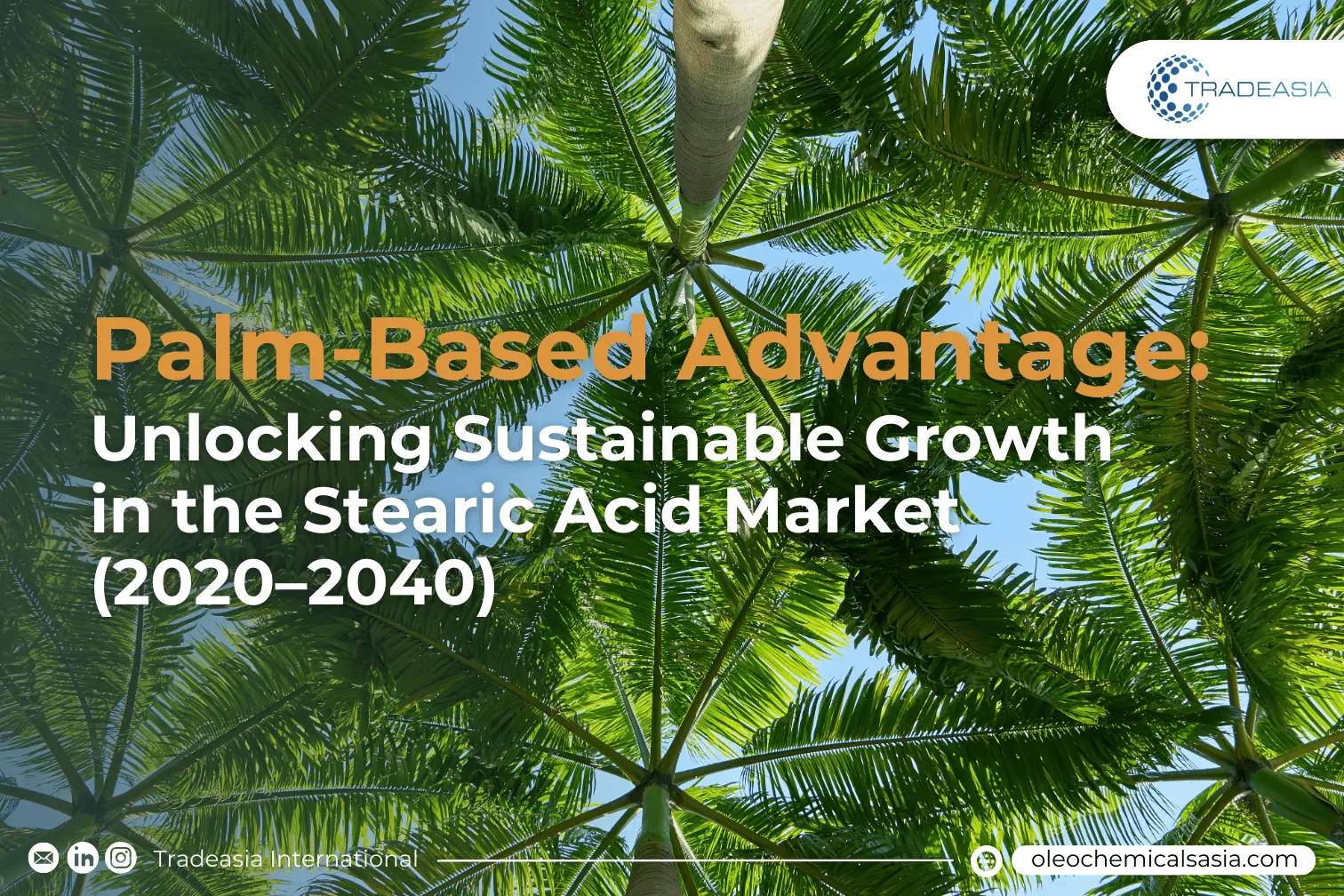Executive Summary
-
Sustainability Edge – Palm-based stearic acid offers renewable, carbon-neutral advantages over petroleum sources, supported by RSPO and ISCC certifications.
-
Market Growth Potential – Palm stearin demand is projected to grow at ~5% annually through 2033, fueled by food, cosmetics, and industrial applications.
-
Regulatory Alignment – Transparency, traceability, and sustainability are becoming mandatory, giving certified trading companies a competitive edge.
-
Strategic Advantage – By embracing certification, green chemistry, and circular economy principles, trading firms can secure premium market access and future-proof their portfolios.
The global stearic acid market is on the brink of transformation, with sustainability and consumer demand reshaping its direction for the decades ahead. At the heart of this shift lies palm oil—particularly palm stearin—as a reliable and sustainable raw material for stearic acid production. By moving away from petroleum-based sources and embracing palm-derived alternatives, trading companies can position themselves at the center of sustainable growth, supported by certification frameworks and innovations in green chemistry.
Palm Oil as a Greener Alternative
Palm oil, especially its derivative palm stearin, plays a pivotal role as a feedstock in producing stearic acid. Unlike petroleum-based sources, palm oil offers renewable and carbon-neutral advantages, provided it is cultivated using sustainable practices. This contrast is crucial: petroleum is finite and carbon-intensive, while palm plantations—when managed responsibly—can contribute to biodiversity preservation, reduce deforestation, and strengthen local communities.
Certification systems have become an essential part of ensuring that palm-based stearic acid meets global sustainability standards. The Roundtable on Sustainable Palm Oil (RSPO) guarantees compliance with strict environmental and social criteria, while the International Sustainability and Carbon Certification (ISCC PLUS) extends its assurance to oleochemical derivatives, including stearic acid. These frameworks not only protect ecosystems but also give trading companies the credibility they need in a market increasingly shaped by sustainability-conscious consumers and regulators.
Cost Efficiency Meets Market Growth
The cost-effectiveness of palm oil is another key driver of its long-term role in the stearic acid industry. With Indonesia and Malaysia accounting for the majority of global palm oil production, the region’s established infrastructure ensures consistent supply at competitive costs. This steady availability makes palm stearin especially attractive for industries ranging from food and cosmetics to industrial manufacturing.
The market outlook reflects this momentum. Palm stearin is projected to record a steady annual growth rate of around 5% through 2033, highlighting strong opportunities tied to rising consumer preference for natural and eco-friendly ingredients. At the same time, advancements in green chemistry—such as cleaner processing technologies, higher yields, and integration of renewable energy—are enhancing the quality and sustainability of palm-based stearic acid. These improvements also strengthen the economic case for companies that want to combine cost savings with environmental responsibility.
Global regulations are placing increasing emphasis on transparency, traceability, and sustainable sourcing. For trading companies, this means that adopting certified palm-based raw materials is no longer optional but a necessity to remain competitive. By aligning with RSPO and ISCC frameworks and embedding transparent reporting into their operations, traders can not only comply with regulations but also differentiate themselves in premium market segments where sustainability is a key purchasing factor.
Equally important is the ability to anticipate future regulatory shifts. Companies that invest early in sustainability reporting, certification, and compliance systems will be better positioned to adapt to stricter standards, avoiding potential disruptions while building stronger customer trust.
The palm-based stearic acid market offers trading companies a clear pathway to growth—one that balances profitability with responsibility. By partnering with certified producers, ensuring robust supply chain transparency, and committing to innovation in sustainable processing, trading firms can strengthen their role as reliable and forward-looking market players. Beyond compliance, such strategies open access to premium segments where sustainability commands greater value and customer loyalty.
Looking ahead to 2040, palm-derived stearic acid represents not just a cost-effective material but also a cornerstone of sustainable supply chains. With its environmental advantages, competitive pricing, and alignment with global green chemistry trends, palm-based stearic acid is set to shape the future of the market while offering trading companies an attractive platform for long-term growth.

Leave a Comment